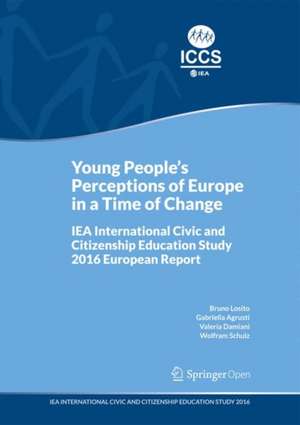Young People's Perceptions of Europe in a Time of Change: IEA International Civic and Citizenship Education Study 2016 European Report
Autor Bruno Losito, Gabriella Agrusti, Valeria Damiani, Wolfram Schulzen Limba Engleză Paperback – 14 mai 2018
Preț: 415.77 lei
Nou
Puncte Express: 624
Preț estimativ în valută:
79.56€ • 82.90$ • 65.87£
79.56€ • 82.90$ • 65.87£
Carte disponibilă
Livrare economică 13-27 martie
Preluare comenzi: 021 569.72.76
Specificații
ISBN-13: 9783319739595
ISBN-10: 331973959X
Pagini: 75
Ilustrații: XV, 72 p.
Dimensiuni: 210 x 297 mm
Greutate: 0.29 kg
Ediția:1st ed. 2018
Editura: Springer International Publishing
Colecția Springer
Locul publicării:Cham, Switzerland
ISBN-10: 331973959X
Pagini: 75
Ilustrații: XV, 72 p.
Dimensiuni: 210 x 297 mm
Greutate: 0.29 kg
Ediția:1st ed. 2018
Editura: Springer International Publishing
Colecția Springer
Locul publicării:Cham, Switzerland
Cuprins
Executive Summary.- 1. General Overview.- 2. Students’ Perceptions of Their Being European and Students’ Opportunities to Learn about Europe at School.- 3. Students’ Attitudes toward Freedom of Movement and Immigration in Europe.- 4. Students’ Perceptions of Europe and the Future of Europe.- 5. Main Findings and Implications for Policy and Practice.- Appendices.
Recenzii
Notă biografică
Textul de pe ultima copertă
The IEA’s International Civic and Citizenship Education Study (ICCS) investigates the ways in which young people are prepared to undertake their roles as citizens in a range of countries in the second decade of the 21st century. ICCS 2016 is the second cycle of a study initiated in 2009.
This report from ICCS focuses on data collected in the 15 countries that participated in the study’s 2016 European regional questionnaire. It reveals lower secondary school students’ views on European identity, their perceptions of freedom of movement and immigration, and
their opinions of Europe and its future. It also, for the 12 European countries that participated in both ICCS 2009 and ICCS 2016, looks at changes across this time period, in young people’s perceptions of immigration and European identity. Comparison with the complete international
study will enable readers to review the extent to which region-specific perceptions are related to other factors, such as students’ level of civic knowledge and social or educational contexts. Over the past 50 years, the IEA has conducted comparative research studies in a range of
domains focusing on educational policies, practices, and outcomes in many countries around the world. The association conducted its first survey of civic education in 1971. The reliable comparative data collected by ICCS 2016 will allow education systems to evaluate the strengths of educational policies, both internationally and within a regional context, and to measure their progress toward achieving critical components of the United Nations’ 2030 agenda for sustainable development.
Caracteristici
Presents findings from ICCS 2016 and additional materials specific to the European region Examines students' perceptions of European identity, opportunities to learn about Europe and issues related to freedom of movement and migration Sheds light on young people's perceptions of the future of Europe and their own individual future
